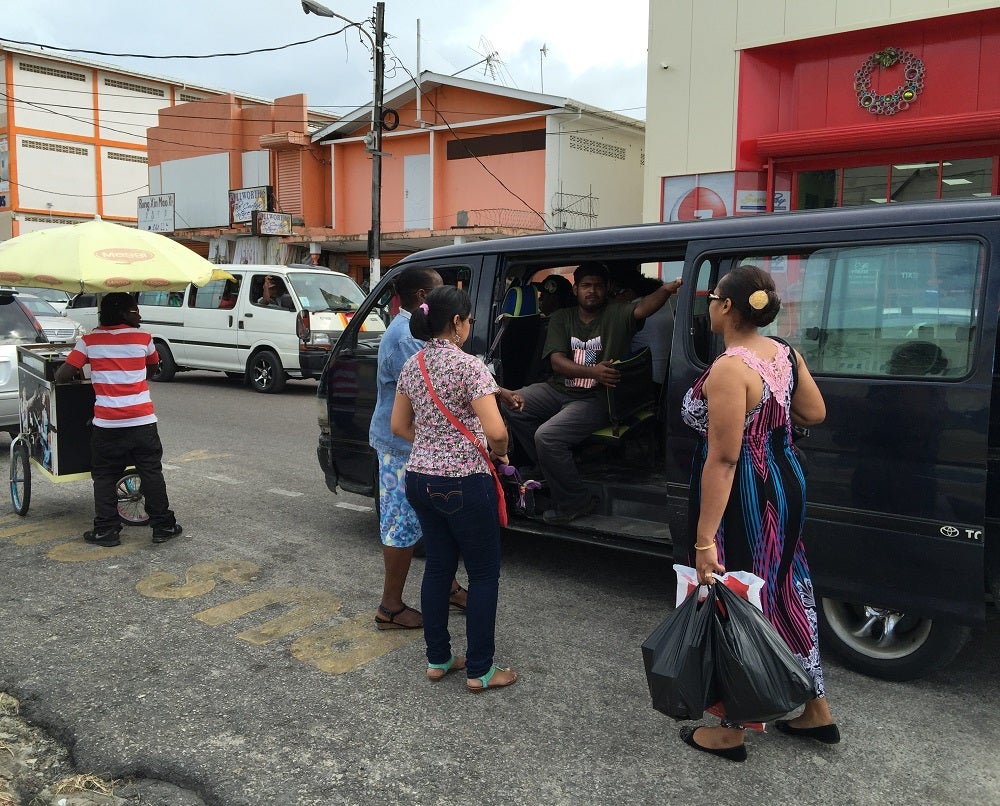Female passengers using public transportation in central Georgetown, Guyana. Photo author Nigel Durrant
Guyana’s 2015/2016 budget, titled “A fresh approach to the Good Life in a Green Economy”, established a veritable moral compass for the newly installed Government of Guyana outlining a new policy direction of people-centric development. The subsequent news release by the Social Protection Ministry in Guyana advising that the Ministry has recently commenced developing a national gender policy, provoked thoughts, at least for me, of how the IDB could lend support to these important initiatives by mainstreaming gender equity in Guyana’s transportation services.
In appraising the matter, I was struck by the common perception of gender which appears restricted to the narrow view of matters pertaining solely to women; an optic which supports the declaration of success in mainstreaming gender simply by ensuring participation by equal numbers of women and men or fixing institutional constructs so that the proverbial glass ceiling seems less evident. In fact, based purely on observation (no criticism intended), this approach may be innocently perpetuated in the policy being developed; given the trending rhetoric on women I hear being bandied about. I agree that there should be greater efforts in favor of women and gender equity but in my view the tenets underpinning a national gender policy should really go beyond the consideration of biological equity. Attention should be given to the development of a national gender policy for universal accessibility in the provision of opportunities and social services like transport for all, irrespective of biology – aren’t men also gendered?
It is true that transportation infrastructure and services have been traditionally designed to provide mobility to mainly men traveling to their place of work. Consequently, because women’s travel patterns are differently motivated as mainly caregivers there is a real need to retrofit transportation constructs to equitably serve the needs of women. For example, did you know that conventional seatbelts do not fit pregnant women properly? But while a strong case has been made to modernize and retrofit transportation for the needs of women it simply isn’t sufficient! We have also to consider the existence of other demographics like differently abled people – aren’t they also gendered?
Considering that Guyana’s national gender policy is currently in development, in a setting that lacks information related to gender & transport, the situation warrants the urgent formation of a system for the collection of such.
What appears to be lacking are three things 1. A sustainable institutional arrangement for data collection; 2. Data collection disaggregated by gender and demographics; and 3. Informatics to facilitate Big Data analytics.
The view that has emerged in supporting Guyana with its policy initiatives is about helping to create a strong sustainable institution facilitated by continuous training for scientific data collection and cutting edge analytics. This intervention should serve to better inform national policy and actions beyond gender to include the diverse, specialized needs of all demographics and give broader more inclusive meaning to a national gender policy which indeed fosters – “A fresh approach to the Good Life in a Green Economy”.
Follow us on Twitter: @IDB_CarDevTrend


Brian–good start in Guyana and fully agree on developing a framework that is more inclusive. Emphasis on data cannot be stressed enough so glad that you raised it. Are other countries in the region doing anything similar? On the definition of gender, the region lags behind in LAC on broadening to include the LGBT community–a topic that must be reckoned with sooner rather than later.